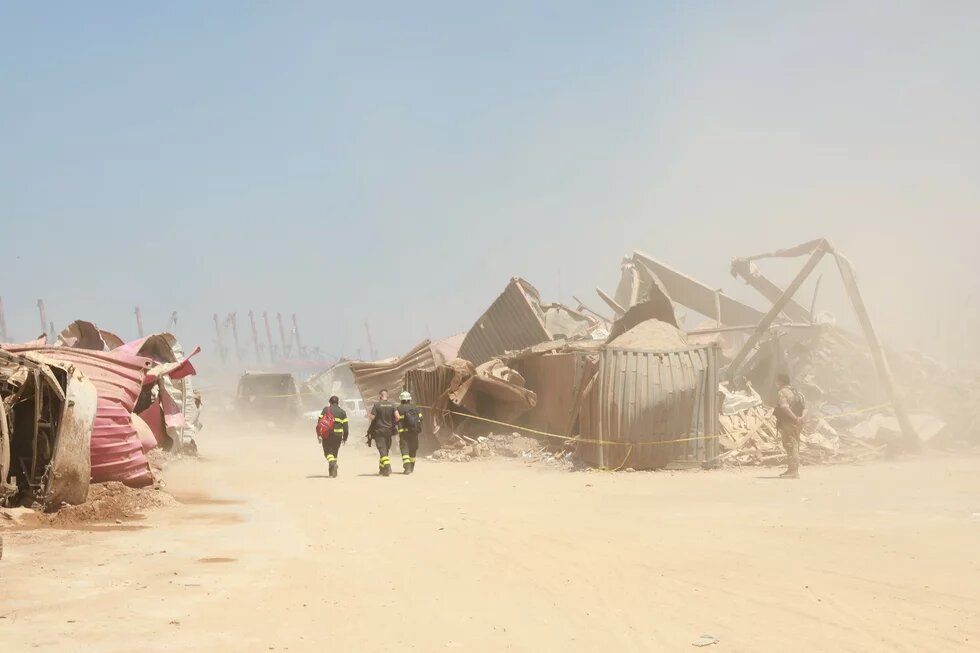The first anniversary of the death of a family member or of a natural disaster is always a heavy time. Memories and feelings will re-surface – things that had been pushed aside by everyday activities and in order to get on with one‛s life. Now, a few days before the first anniversary of the explosion that destroyed the port of Beirut on 4 August 2020, many photos and videos are being shared on social media, and Lebanese TV is, once again, reporting on the catastrophe that happened that day. One TV station even produced a video that, using computer animation, showed victims of the explosion talking about that day – something that caused a major indignation.

The first anniversary of the death of a family member or of a natural disaster is always a heavy time. Memories and feelings will re-surface – things that had been pushed aside by everyday activities and in order to get on with one‛s life. Now, a few days before the first anniversary of the explosion that destroyed the port of Beirut on 4 August 2020, many photos and videos are being shared on social media, and Lebanese TV is, once again, reporting on the catastrophe that happened that day. One TV station even produced a video that, using computer animation, showed victims of the explosion talking about that day – something that caused a major indignation.
While the citizens of Beirut are trying to deal with the fallout of the massive explosion, the country as a whole is in free-fall. Many of the damaged buildings and façades are still only too visible, and the wheat silo that was destroyed in the port is a festering wound in the city‛s skyline. The economic decline appears to be unpreventable, with the currency at only a fraction of the value it had in 2019. Now, because of the hyperinflation, petrol has become scarce, and much of it is being smuggled into neighbouring Syria, as the breakdown there has been going on for much longer and thus petrol is at an even higher premium.
Especially for the middle class this economic decline presents a further trauma. Those, who up until now were able to lead a good life, are suddenly unable to even get hold of necessities. There is a lack of baby food, paracetamol and basic staples. Most foodstuffs[1] are being imported into Lebanon, and to the degree that the Lebanese pound is losing its value; they are becoming less and less affordable. This decline is an additional shock for the Lebanese middle class, and one that is hard to stomach. The helplessness of people faced with this rapid decline is tangible and in an almost trance-like state, they are only just trying to get on with things. Most are dependent on dollars sent from abroad – money remitted by relatives living in Dubai, Europe and other parts of the world.
While the civilian population is trying to deal with all these traumas, the political elite, seemingly unimpressed by the misery, continues to function purely within their systems of patronage. After the resignation of Premier Saad Hariri, another establishment candidate has been nominated for the job. The billionaire Najib Mikati, a former prime minister, is one of the super-rich and originally from one of the country‛s poorest cities, Tripoli. He wants to form a new government; however, nothing indicates that there will be any kind of change – it‛s just more of the same old thing.
While the elite, unwilling to change anything, continues to ruin the country, it also obstructs any investigation into the root causes of the explosion. Here, little progress has been made, as the investigators are being denied access to witnesses and, time after time, new ones are replacing them. Most recently, people were told that the then chief investigator had been biased, as the explosion too, had damaged his house. The current investigating judge, Tarek Bitar, wants to question members of parliament and thus has asked that their immunity be lifted[2] – so far without any success. For weeks, the families of the victims have been protesting in the streets, demanding justice. They are certain, the whole affair wasn‛t a catastrophe but a crime perpetrated by the political elites against their families.
The German government has helped with rebuilding the city, and also with the removal of tonnes of chemicals that hadn‛t blown up on 4 August 2020 from the port area.[3] Today, Germany is one of the major aid donors to the country and accordingly should be able to influence the projects of it Lebanese partners. However, it is crucial not to subsidise Lebanon‛s government but to enable civil society organisations to distribute aid in a more equitable way. In addition, the German government should consider joining the sanctions against high-ranking politicians that were announced by France. The refusal to undertake any kind of reform, as well as the obstruction of all efforts to investigate the explosion that occurred in the port, have to viewed as evidence that the Lebanese government does not have an even fundamental grasp of democratic principle.
[3] https://www.n-tv.de/panorama/Giftstoffe-aus-Beirut-sind-in-Deutschland-…
The new head of the Heinrich Böll Foundation's office in Beirut, Anna Fleischer, spoke to Deutschlandfunk on the first anniversary of the explosion about the situation of art and culture in the still-destroyed capital >>